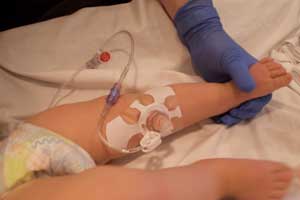- Home
- Editorial
- News
- Practice Guidelines
- Anesthesiology Guidelines
- Cancer Guidelines
- Cardiac Sciences Guidelines
- Critical Care Guidelines
- Dentistry Guidelines
- Dermatology Guidelines
- Diabetes and Endo Guidelines
- Diagnostics Guidelines
- ENT Guidelines
- Featured Practice Guidelines
- Gastroenterology Guidelines
- Geriatrics Guidelines
- Medicine Guidelines
- Nephrology Guidelines
- Neurosciences Guidelines
- Obs and Gynae Guidelines
- Ophthalmology Guidelines
- Orthopaedics Guidelines
- Paediatrics Guidelines
- Psychiatry Guidelines
- Pulmonology Guidelines
- Radiology Guidelines
- Surgery Guidelines
- Urology Guidelines
Patients with sepsis at increased risk of heart attack and stroke

In a new study, it has been found out that Patients with sepsis at increased risk of heart attack and stroke especially in the first month after discharge from the hospital.
According to a large Taiwanese study, Patients with sepsis are at increased risk of stroke or heart attack in the first 4 weeks after hospital discharge. The findings of the study have been published in CMAJ (Canadian Medical Association Journal). This study extends the findings of an earlier Danish study that reported similar trends.
Sepsis accounts for an estimated 8 million deaths worldwide, and in Canada causes more than half of all deaths from infectious diseases. It is the leading cause of avoidable deaths in Britain, killing at least 44,000 people every year. Sepsis triggers the immune system to cause inflammation in the body, which can rupture fatty deposits in arteries and block them, causing a stroke or heart attack.
The Researchers examined data on more than 1 million people in Taiwan, of whom 42 316 patients had sepsis, matched with control patients in the hospital and the general population. All sepsis patients had at least one organ dysfunction, 35% were in the intensive care unit and 22% died within 30 days of admission. The study found that out of 42,300 sepsis patients, 830 had a stroke and 185 had a heart attack within 180 days of discharge from the hospital. In total, 51 per cent of heart attacks and strokes happened within 35 days of leaving the hospital. The risk was highest in the first 7 days after discharge, with more than one-quarter (26%) of myocardial infarction or stroke occurring in the immediate period and 51% occurring within 35 days.
"We found that within the first 4 weeks after discharge from hospital was the critical period with a markedly elevated risk of Heart attack and stroke," writes Dr Chien-Chang Lee, Department of Emergency Medicine, National Taiwan University Hospital, Taipei, Taiwan, with coauthors.
The authors also found that younger patients with sepsis aged 20 to 45 years were at higher risk of heart attack or stroke compared to patients over age 75.
"Based on our study (Han Chinese) and the study in Denmark (European) that reported similar findings for two different ethnic groups, it is likely that these results are generalizable to different populations," write the authors.
Sepsis hospitalizations were associated with increased risks of subsequent long-term health consequences involving the cardiovascular system and nervous system and strong vigil is required in all patients of Sepsis after the discharge.

Disclaimer: This site is primarily intended for healthcare professionals. Any content/information on this website does not replace the advice of medical and/or health professionals and should not be construed as medical/diagnostic advice/endorsement or prescription. Use of this site is subject to our terms of use, privacy policy, advertisement policy. © 2020 Minerva Medical Treatment Pvt Ltd